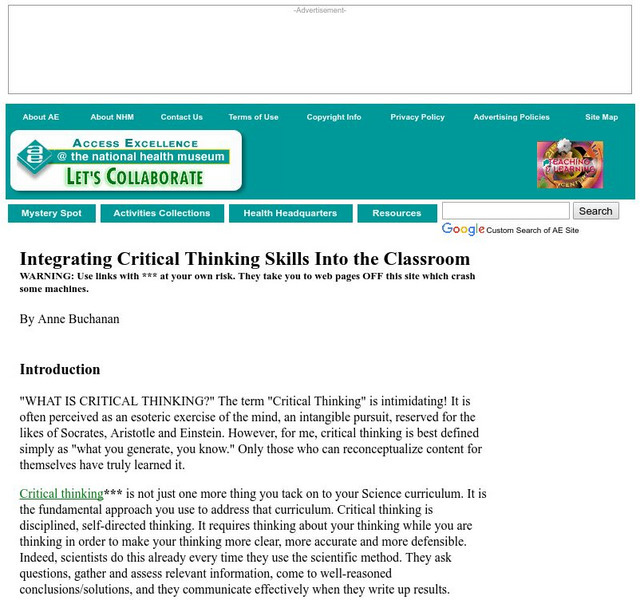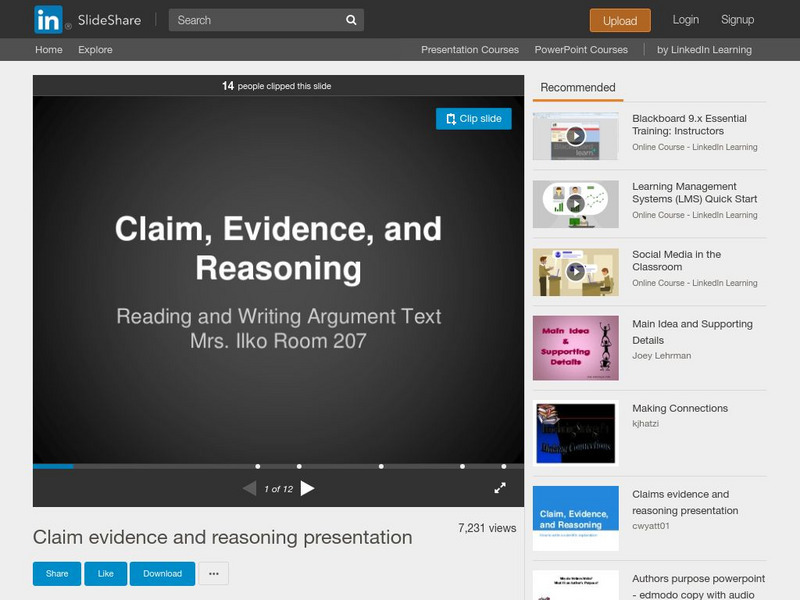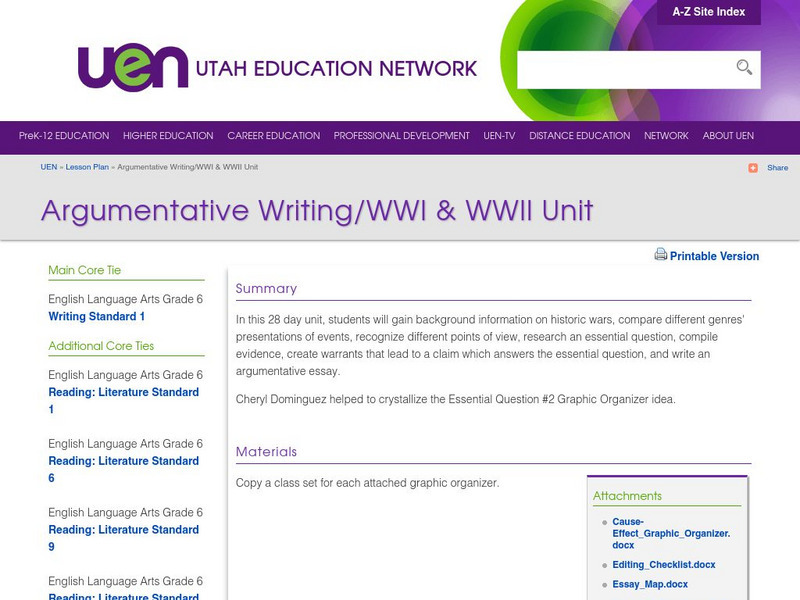Web Center for Social Research Methods
Research Methods Knowledge Base: Deduction and Induction
This site provides a good explanation of deductive and inductive thinking.
Other
Persuasive/argumentative Essay vs. Opinion Writing
This lesson plan teaches students that writing a persuasive or argumentative essay for class is the same as writing an opinion article for their local newspaper. The lesson plan includes showing students examples of opinion writings and...
Other
Wsu: Improving Your Argument
Students writing persuasive essays run the risk of using inaccurate or illogical reasoning. This site by Weber State University provides pointers to help eliminate this problem. Several dos's and don'ts are given, as are 14 common...
Other
Speaking Effectively: Supporting the Talk
This substantial section focuses on supporting the main points of your speech or presentation. Find out how to avoid faulty reasoning and irrational appeals.
Grammarly
Grammarly Handbook: Analysis
This page explains that analysis is crucial to the success of a paper as it answers the questions how and why and shows the reader that the writing is knowledgable. Logic and development work together to make the analysis clear. Examples...
Grammarly
Grammarly Handbook: Evidence and Proof
This page focuses on evidence and proof to support your main ideas in papers. The evidence must come from primary sources like lab results or secondary sources like quotes from experts that support your thesis.
ReadWriteThink
Read Write Think: Persuasion Rubric
A printable four-point rubric to use when assessing a persuasive piece with a focus on organization, a goal or thesis, reasons/support, audience, word choice, visuals/delivery, and grammar/usage/mechanics. Directions on how to use this...
Grammarly
Grammarly Handbook: Evidence
This page focuses on the evidence to support points in an essay. Be sure you have enough support for each point and that the points are strong ones. It also suggests you double check both direct and indirect quotations in your paper to...
Brown University
Brown University: Critical Writing and Thinking
Resource explains exactly what critial writing and thinking are, questions to help you think critically, paper writing tips, troubleshooting, and more.
National Health Museum
Access Excellence: Integrating Critical Thinking Skills
This site from Access Excellence explores how, as an educator, you can incorporate critical thinking skills into the classroom. Content focuses on how to cover content so that students can grasp information, engage with the teacher, read...
Austin Independent School District
Austin Independent School District: Logical Fallacies [Pdf]
A slide show explaining different types of fallacies in persuasive texts including personal attack, bandwagon, appeal to authority, and many more. Then try to find the fallacy in several examples; answers and explanations provided.
Quia
Quia: Fact or Opinion?
This is a 30 question quiz on separating fact from opinion. Students read the statement and select fact or opinion. Java plugin is required.
iCivics
I Civics: Games: Argument Wars
Games in which players act as lawyers arguing head to head before a judge about real Supreme Court cases.
Polk Brothers Foundation Center for Urban Education at DePaul University
Depaul University: Center for Urban Education: Evaluate Support for a Claim[pdf]
This resource provides a downloadable worksheet to use after reading a nonfiction text. Students will evaluate an author's support for a claim by answering the questions and prompts provided on the worksheet.
University of Illinois
University of Illinois Extension: Is It What I Think or What I Know? (Fact or Opinion)
This short lesson provides a fairly simple way to teach young students the difference between fact and opinion.
E Reading Worksheets
E Reading Worksheets: Fact and Opinion Lessons
In this learning module, students will learn more about the differences between facts and opinions. A PowerPoint presentation and related activity are provided to reinforce the topic of facts vs. opinions. This module is designed to...
Other
Flickr: Critical Thinking Skills Poster
A downloadable critical thinking skills poster based on the original six levels of Bloom's taxonomy.
Tom Richey
Slide Share: Claim Evidence and Reasoning
A slideshow with twelve slides about reading or writing an argument, analyzing the claim and looking at how it is supported with observation, evidence, and reasoning.
Utah Education Network
Uen: Argumentative Writing/wwi & Wwii Unit
In this unit, students will gain background information on historic wars. Student will compare different media forms about these events, attend to different perspectives, research the unit's essential question, and then write an...
Other
Critical Thinking: Basic Questions & Answers
An interesting interview with Richard Paul discussing what critical thinking means. There are many insights as to what critical thinking involves and how it should be used in the classroom.
Other
Becoming a Critic of Your Thinking
This resource presents an article that explains why it is important to be someone who is a good thinker. Provided are four strategies for critical thinking.
Cornell University
Cornell University: Library: Critically Analyzing Information Sources
A quick guide to help you determine the relevance and authority of a resource.
Sophia Learning
Sophia: Elements of an Effective Argument
Discussion focuses on understanding the three academic language objectives that make an effective argument: understand the concept of a thesis statement, the significance of writing an argument with an audience in mind, and the...
Polk Brothers Foundation Center for Urban Education at DePaul University
De Paul University: Center for Urban Education: Evaluate the Strength of Evidence [Pdf]
This resource provides a downloadable worksheet that will assist students after they read a piece of nonfiction. Students will answer guided questions to help them determine the strength of evidence used when supporting a claim....
















